Character Reference Letter To Judge
[Your Name]
[Your Address]
[City, State, Zip Code]
[Email Address]
[Phone Number]
[Date]
[Judge's Full Name]
[Judge's Designation]
[Court's Name]
[Court's Address]
[City, State, Zip Code]
Re: Character Reference for [Defendant's Full Name]
Case: [Case Number, if available]
Dear Honorable [Judge's Last Name],
I am writing this letter to provide a character reference for [Defendant's Full Name], whom I have known for [number of years or months]. I am writing voluntarily and without any persuasion or compensation. I am well aware of the seriousness of the charges against [Defendant's Last Name], but I firmly believe that it is important to present a balanced view of their character and actions.
I have had the privilege of knowing [Defendant's First Name] in the capacity of [describe your relationship with the defendant, such as friend, colleague, neighbor, etc.]. During our time together, I have had the opportunity to observe [Defendant's First Name]'s personality, behavior, and interactions with others.
I want to emphasize that [Defendant's First Name] has consistently displayed [list positive qualities and attributes of the defendant, such as honesty, integrity, compassion, work ethic, etc.]. [He/She] has been an active and contributing member of [mention any relevant community involvement, charitable activities, or work] and has demonstrated a genuine commitment to making a positive impact on the lives of those around [him/her].
Furthermore, I believe that [Defendant's First Name] has shown remorse for [his/her] actions and a willingness to take responsibility. [Share specific instances or examples where the defendant has shown remorse or taken steps towards rehabilitation or personal growth].
In light of [Defendant's First Name]'s character and the positive contributions [he/she] has made to society, I kindly request that you consider these aspects when making your decision in [Defendant's Last Name]'s case. I firmly believe that [he/she] has the potential to learn from [his/her] mistakes and to continue [his/her] journey towards becoming a better and law-abiding citizen.
I understand that your role as a judge is to ensure justice is served, and I trust in your judgment to weigh all the relevant factors in [Defendant's Last Name]'s case. I am hopeful that you will consider this character reference letter as a small contribution to your understanding of the person [Defendant's First Name] truly is.
Thank you for your time and consideration. If you have any further questions or require additional information, please do not hesitate to contact me at [your phone number] or [your email address].
Sincerely,
[Your Signature]
[Your Typed Name]
Professional Character Reference Letter to Judge
Subject: Character Reference for [Defendant’s Name]
Dear Judge [Last Name],
I am writing to provide a character reference for [Defendant’s Name], whom I have known for [number of years] in my capacity as [relationship, e.g., employer, mentor, community leader]. During this time, I have found [him/her] to be responsible, honest, and committed to the community.
I respectfully ask the court to consider [Defendant’s Name]'s good character and contributions when making any determinations. I believe [he/she] has learned from this situation and will continue to be a positive member of society.
Thank you for your consideration.
Sincerely,
[Your Name]
[Position/Relationship]
[Contact Information]
Heartfelt Character Reference Letter to Judge
Subject: Support for [Defendant’s Name]
Dear Judge [Last Name],
I am deeply honored to provide a character reference for [Defendant’s Name]. I have known [him/her] for [number] years, and throughout that time, I have witnessed [his/her] compassion, integrity, and dedication to helping others.
I humbly request that the court take into account [Defendant’s Name]'s exemplary character and community contributions in any decisions regarding the case. I sincerely believe that [he/she] will continue to make positive impacts moving forward.
Thank you for your time and understanding.
Warm regards,
[Your Name]
[Relationship]
[Contact Information]
Formal Legal Character Reference Letter to Judge
Subject: Character Reference Regarding [Defendant’s Name]
Dear Honorable Judge [Last Name],
I am writing to you in support of [Defendant’s Name], whom I have known for [number] years. In my professional opinion as [position, e.g., lawyer, supervisor, educator], [he/she] demonstrates honesty, reliability, and respect for others.
I respectfully urge the court to consider [Defendant’s Name]'s character in your deliberations, as I believe [he/she] is genuinely remorseful and committed to lawful conduct.
Thank you for your attention.
Sincerely,
[Your Name]
[Position]
[Contact Information]
Informal Character Reference Letter to Judge
Subject: Letter in Support of [Defendant’s Name]
Dear Judge [Last Name],
I am writing to share my perspective on [Defendant’s Name], whom I have known for several years. [He/She] is kind, trustworthy, and has always acted with integrity in both personal and professional matters.
I hope this insight into [Defendant’s Name]'s character will be helpful as you consider [his/her] case. I genuinely believe [he/she] is committed to doing the right thing moving forward.
Thank you for your consideration.
Sincerely,
[Your Name]
[Relationship]
[Contact Information]
Community Leader Character Reference Letter to Judge
Subject: Character Reference for [Defendant’s Name]
Dear Judge [Last Name],
As a community leader in [community or organization], I have had the pleasure of knowing [Defendant’s Name] for [number] years. [He/She] consistently demonstrates civic responsibility, compassion, and ethical behavior.
I respectfully ask the court to recognize [Defendant’s Name]'s positive impact on our community and consider this when evaluating [his/her] case. I believe [he/she] is sincerely committed to personal growth and contributing positively to society.
Sincerely,
[Your Name]
[Title/Organization]
[Contact Information]
Employer Character Reference Letter to Judge
Subject: Employment-Based Character Reference for [Defendant’s Name]
Dear Honorable Judge [Last Name],
I am writing regarding [Defendant’s Name], an employee under my supervision for the past [number] years. [He/She] has proven to be dependable, hardworking, and ethical in all professional interactions.
I respectfully submit this letter to provide insight into [Defendant’s Name]'s character and integrity as you consider the matters before you. I believe [he/she] has learned from past actions and will continue to act responsibly.
Thank you for your consideration.
Sincerely,
[Your Name]
[Position]
[Company/Organization]
[Contact Information]
Personal Friend Character Reference Letter to Judge
Subject: Character Reference for [Defendant’s Name]
Dear Judge [Last Name],
I have had the privilege of knowing [Defendant’s Name] as a personal friend for [number] years. [He/She] is a person of honesty, loyalty, and genuine kindness, always willing to support family, friends, and the community.
I ask that you take this character reference into account in your deliberations. I am confident that [Defendant’s Name] is remorseful and will continue to contribute positively to society.
Sincerely,
[Your Name]
[Relationship]
[Contact Information]
What / Why: Purpose of Character Reference Letter to a Judge
- Provides insight into the personal qualities, ethics, and conduct of the defendant.
- Helps the court understand the individual’s character beyond the legal charges.
- Can influence sentencing, probation considerations, or other judicial decisions.
- Supports claims of rehabilitation, remorse, or community contribution.
Who Should Send the Letter
- Friends, family members, employers, educators, mentors, or community leaders who know the defendant well.
- Individuals with firsthand knowledge of the defendant’s character and integrity.
Whom Should the Letter Be Addressed To
- The presiding judge handling the defendant’s case.
- Occasionally copied to the defendant’s attorney if protocol requires.
When to Send a Character Reference Letter
- Prior to sentencing hearings.
- When requested by defense counsel.
- When intending to supplement other legal documents regarding character assessment.
How to Write and Send the Letter
- Start with a clear subject line stating it is a character reference.
- Introduce yourself and explain your relationship with the defendant.
- Detail personal qualities, examples of good behavior, and community involvement.
- Keep language respectful and professional.
- Submit through the defendant’s attorney or directly as allowed by court rules.
Requirements and Prerequisites
- Knowledgeable and credible relationship with the defendant.
- Specific examples of positive character traits.
- Adherence to court rules regarding submission and format.
- Optional supporting documentation or verification of claims if necessary.
Formatting Guidelines
- Length: 1–2 pages.
- Tone: respectful, professional, and sincere.
- Style: formal, clear, and concise.
- Include date, address, greeting, body, closing, and signature.
- Avoid exaggeration or unverifiable claims.
After Sending / Follow-up Actions
- Confirm submission with attorney or court clerk if appropriate.
- Keep a copy for personal records.
- Be prepared to provide additional information if requested by the court.
Pros and Cons of Sending a Character Reference Letter
Pros:
- Provides context and insight into the defendant’s character.
- Can positively influence sentencing and judicial discretion.
- Demonstrates support and belief in rehabilitation.
Cons:
- May not be considered if lacking credibility or detail.
- Overly emotional or exaggerated letters can backfire.
- Must comply with court rules or risk being disregarded.
Compare and Contrast With Other Legal Letters
- Compared to victim impact statements: character reference focuses on defendant’s qualities; victim statements focus on harm suffered.
- Compared to recommendation letters for employment: legal context requires more formality and adherence to court rules.
- Alternative: sworn affidavits or testimony about character may supplement written letters.
Tricks and Tips for Effective Character Reference Letters
- Use specific examples to demonstrate integrity, honesty, and reliability.
- Avoid discussing the legal case or justifying actions.
- Keep tone respectful, sincere, and professional.
- Proofread carefully to maintain credibility.
- Coordinate with defense counsel to ensure timely submission.
Common Mistakes to Avoid
- Exaggerating or fabricating character traits.
- Failing to clearly state relationship and duration of acquaintance.
- Discussing case facts or legal defenses.
- Using informal or casual language inappropriate for a courtroom setting.
- Submitting late or to the wrong recipient.
Elements and Structure
- Date and court address (if required).
- Subject line: “Character Reference for [Defendant’s Name]”.
- Salutation to the presiding judge.
- Introduction: Relationship with the defendant.
- Body: Specific examples of positive traits, contributions, and ethical behavior.
- Closing: Respectful request for consideration.
- Signature: Name, title/relationship, contact information.
- Optional attachments: supporting documents or letters of verification.
Does It Require Attestation or Authorization
- Usually does not require legal attestation but must be truthful and credible.
- May require submission via attorney or under oath depending on jurisdiction.
- Authorization or consent from the defendant may be advisable to ensure proper court procedure.

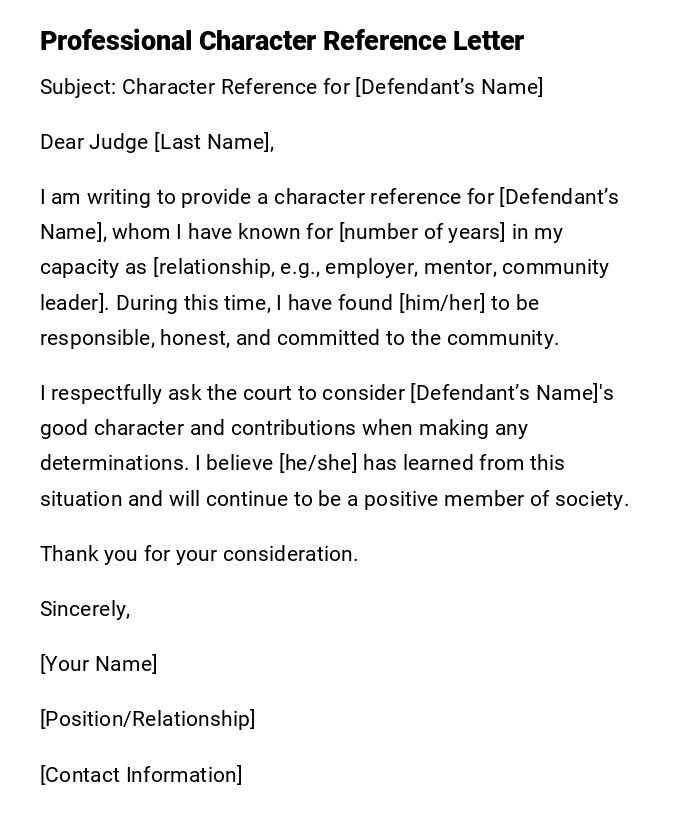
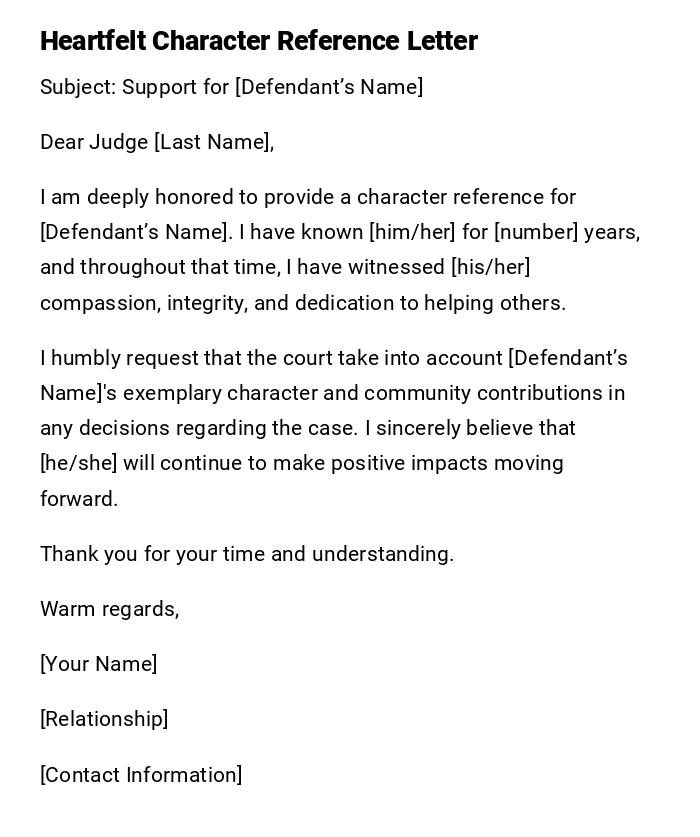
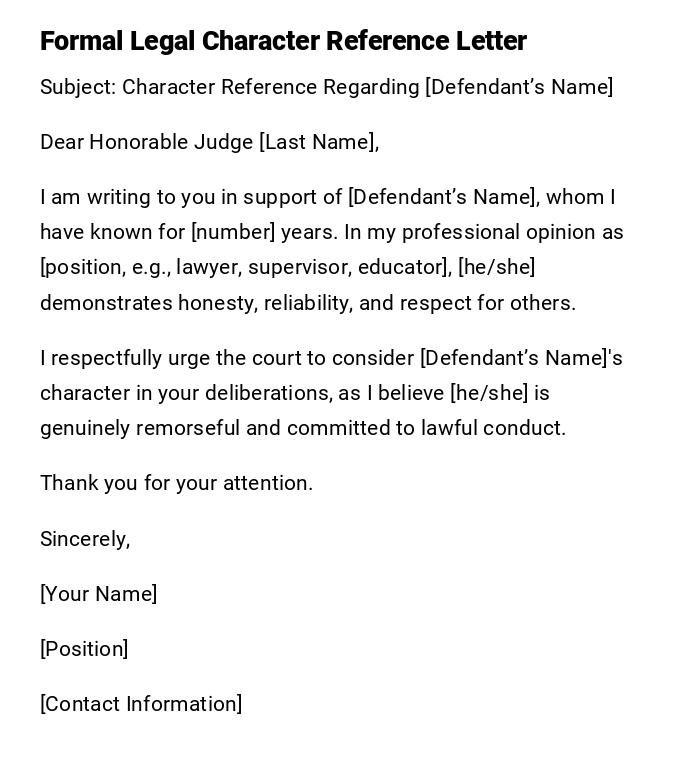
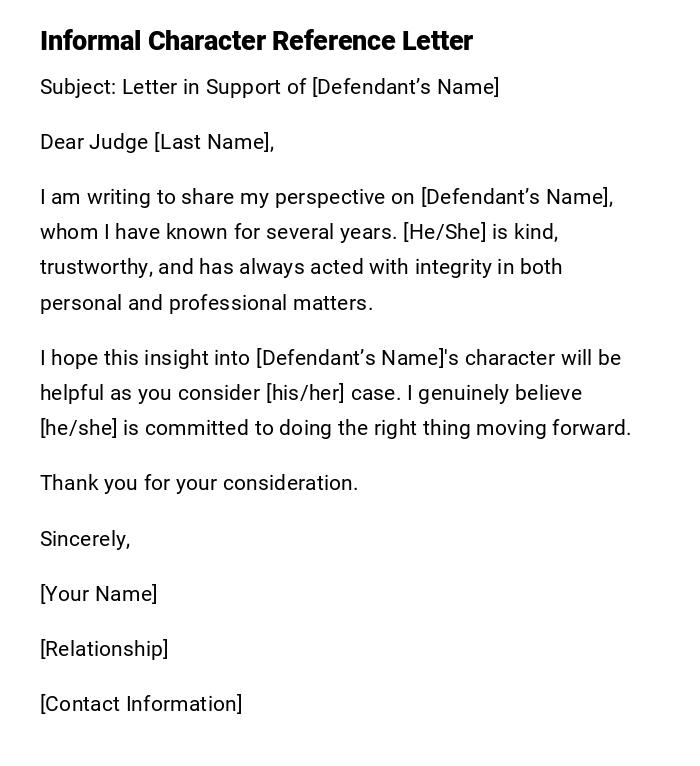
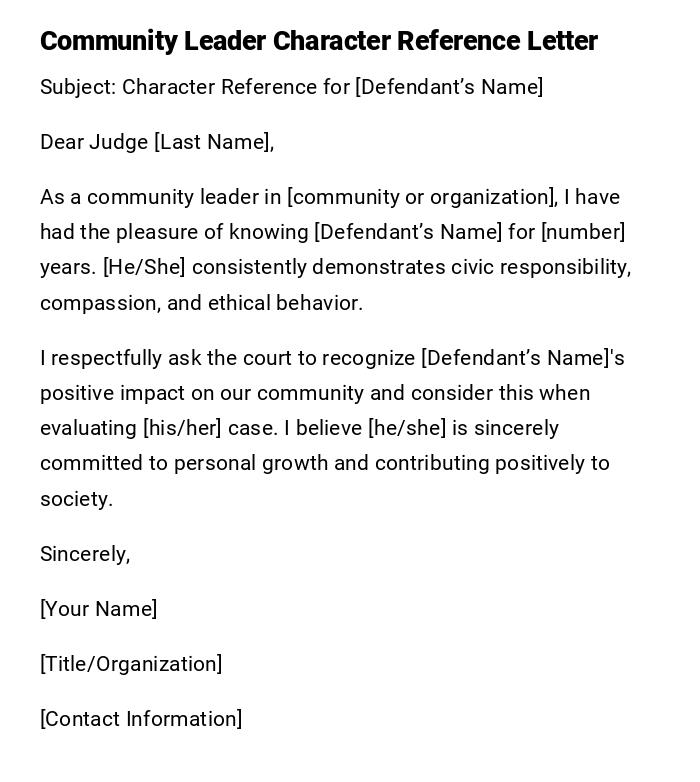
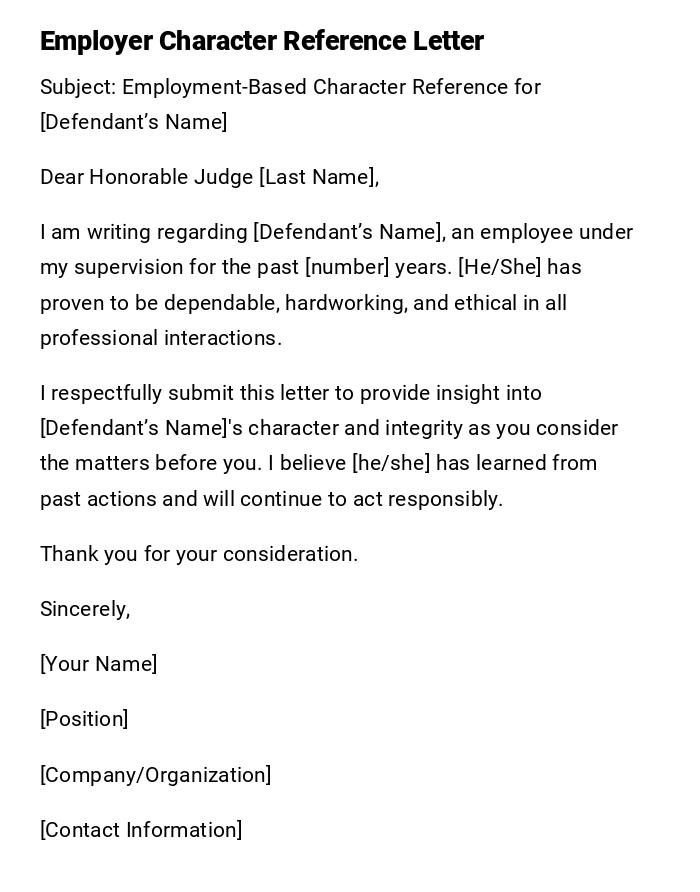
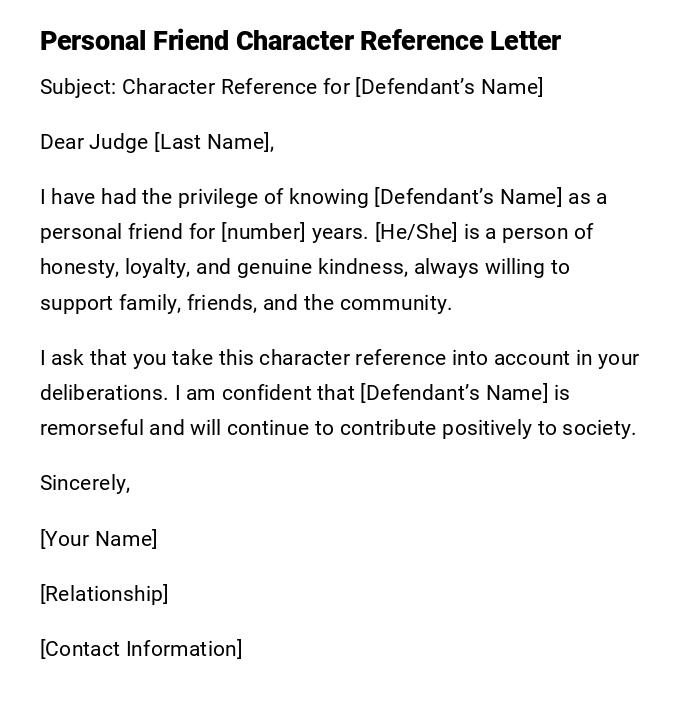

 Download Word Doc
Download Word Doc
 Download PDF
Download PDF